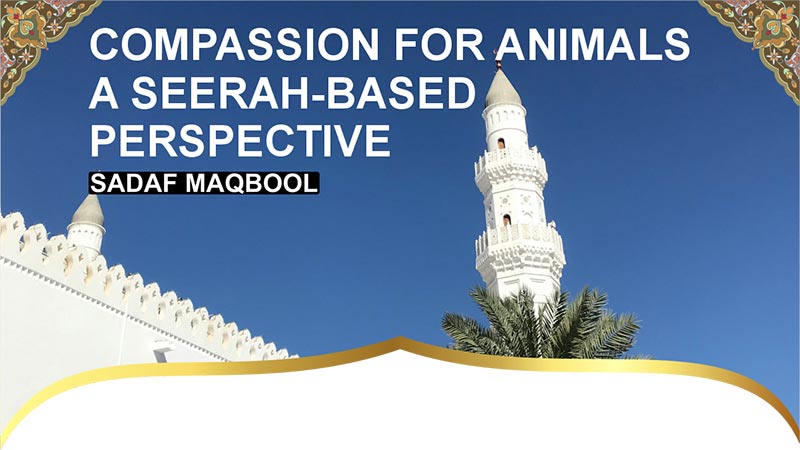Introduction
The ethical treatment of animals has gained increasing global attention, with debates surrounding animal rights, cruelty prevention, and environmental preservation. However, the principles that modern law now attempts to institutionalize were exemplified in their purest form more than fourteen centuries ago by the Prophet of Islam ﷺ. His teachings on mercy were not confined to human beings but extended to every living creature.
The Qur’an repeatedly draws human reflection toward animals, describing them as signs (āyāt) of Allah’s power and artistry. It emphasizes that animals form part of the moral and spiritual ecosystem of the universe. Allah ﷻ declares:
“There is no creature on earth nor a bird that flies with its wings but are communities like you.”(Surah Al-An‘am, 6:38)
The Prophet Muhammad ﷺ actualized this Qur’anic worldview in his daily life. His compassion toward animals was not occasional sentiment but an essential part of his mission as “Rahmatun lil-‘Alameen” (Mercy for all the worlds) — encompassing humans, animals, and nature alike.
1. Qur’anic View of Animal Life
The Qur’an introduces animals as conscious beings who glorify their Creator:
“There is not a thing but celebrates His praise, though you do not understand their glorification.”(Surah Al-Isra, 17:44)
This verse conveys that animals are not mere biological entities but spiritual beings participating in divine worship.
2. Prophetic Character: Embodiment of Mercy
The Prophet ﷺ’s conduct demonstrates mercy that transcended all boundaries. He considered animals part of Allah’s creation deserving care and justice. He said:
“The merciful are shown mercy by the Most Merciful. Be merciful to those on earth, and the One above the heavens will have mercy upon you.”(Sunan al-Tirmidhi, Hadith 1924)
This hadith universalizes compassion — extending it to “those on earth,” not only humans.
3. Examples of the Prophet’s ﷺ Kindness to Animals
a) The Crying Camel
Hazrat Abdullah ibn Ja‘far (RA) narrates:
“The Prophet ﷺ entered a garden of the Ansar. A camel saw him and began to whimper, its eyes overflowing with tears. The Prophet ﷺ approached it, stroked its head until it calmed, and said,
‘Who is the owner of this camel? It has complained to me that you starve it and overwork it. Fear Allah concerning these dumb animals.’”(Sunan Abu Dawood, Hadith 2549)
b) The Story of the Cat
The Prophet ﷺ’s affection for cats is well known. One of His companions, Abu Hurairah (RA) — “the father of kittens” — received his title due to his love for cats, encouraged by the Prophet ﷺ.
He ﷺ warned against cruelty with severe consequences:
“A woman was punished in Hell because she imprisoned a cat till it died. She neither fed it or let it eat from the earth.”(Sahih al-Bukhari, Hadith 3318)
c) Reward for Kindness
In contrast, mercy to animals earns divine forgiveness:
“A man saw a dog panting with thirst. He went down a well, filled his shoe with water, and gave it to the dog. Allah appreciated this deed and forgave him.”(Sahih al-Bukhari, Hadith 2466)
hen the Companions asked, “O Messenger of Allah, is there a reward for us in serving animals?” He replied:
“There is reward for showing kindness to every living creature.”
(Sahih Muslim, Hadith 2244)
This Hadith universalizes compassion, making it an integral act of worship.
4. Ethical Framework of Animal Welfare in the Sunnah
The Prophet ﷺ not only displayed personal kindness but established principles that later guided Islamic law (Fiqh) and ethics.
The fuqaha (jurists) later cited the above mentioned Hadith in discussions on hunting, wildlife protection, and ethical conduct toward animals. For example, Imam al-Nawawi mentioned it in Sharh Sahih Muslim under the chapter "Prohibition of Taking Young Ones from Their Mother Birds.”
a) Feeding and Caring
He )SAW) said:
“It is a great sin for a man to keep an animal and not feed it properly.”(Sunan al-Nasa’i, Hadith 4446)
b) Prohibition of Cruelty for Entertainment
The Prophet ﷺ forbade hunting or harming animals for sport:
“The Messenger of Allah ﷺ cursed the one who takes any living thing as a target.”(Sahih Muslim, Hadith 1958)
c) Humane Slaughter (Zabiha)
Even during slaughter, Islam emphasizes mercy and precision:
“Verily, Allah has prescribed excellence (ihsan) in all things. So when you kill, kill well; when you slaughter, slaughter well. Let one of you sharpen his knife and let the slaughtered animal’s suffering be reduced.”(Sahih Muslim, Hadith 1955)
d) Rights of Working Animals
He ﷺ said:In another narration, he rebuked a man sitting idly on his camel, saying:
“Do not take them as chairs for conversation. Allah has made them subject to you only to reach places you could not reach without them.”(Ahmad ibn Hanbal, Musnad, Vol. 3)
5. Contemporary Relevance
In the modern age, humanity faces moral decline in its treatment of animals — from industrial farming and laboratory testing to deforestation and habitat loss. The Prophet ﷺ’s teachings on balance (Mizan) and stewardship (Khilafah) offer timeless solutions.
The Islamic concept of “Amanah” (trust) defines humans as caretakers, not exploiters, of creation. This responsibility extends to protecting ecosystems, preventing animal cruelty, and ensuring sustainable use of resources. Modern Muslims can revive these Prophetic values through ethical consumption, environmental activism, and compassionate treatment of domestic and wild animals alike.


